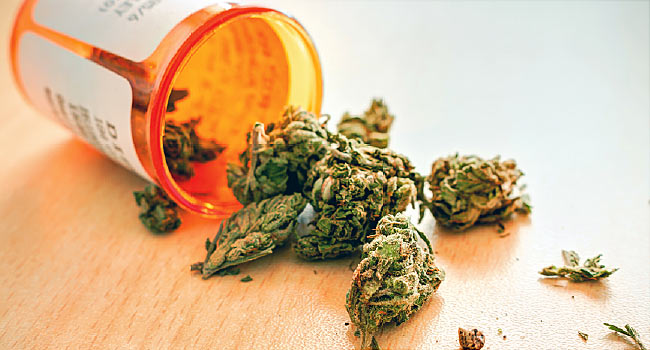There is a sweeping change in how people perceive marijuana globally. Marijuana, particularly in medicinal form is increasingly becoming popular and shaking off its old negative stigma. The change has been spurred by the numerous empirical researches in support of marijuana having immense medicinal benefits. The race by governments to capture shares of the estimated $146.4billion legal marijuana market by 2025 according to a report by Grand View Research Inc. has gained traction over the last years. Governments have been proactive to this new wave by adopting a licensing system for the production of marijuana solely for medicinal purpose. The licensing policy for the commercial production of marijuana—for medicinal purpose —is expected to generate and propel revenue growth for economic development, while it institutes a control system to check its abuse.
Some governments in Africa—Lesotho, Zimbabwe, have embraced the wave of change towards accepting marijuana as a plant of economic value.
Following the legalization of marijuana for medicinal purpose in 2018, Zimbabwe has received applications from about 200 investors/companies interested in growing the plant, the country’s Deputy Minister for Lands, Agriculture, Water, Climate and Rural Resettlement has said. Of the 200 companies, the government has approved 37 investors to produce marijuana for medicinal purpose. The estimated revenue to the government is to the tune of $1.7million—a license cost $46,000 in Zimbabwe. And this is just the first batch of licensing since legalizing marijuana for medicinal purpose.
In Africa’s largest economy—Nigeria—lawmakers are busily wooing investors into the multi-billion legal medicinal marijuana industry for their country. Canadian-American consortium of investors, Access Marijuana Canada Inc. is reported to be in deep negotiations with its local counterparts to seal a business deal in the cultivation and production of medical marijuana oil and powder. In addition to the medicinal benefits to be gained, legal medicinal marijuana will shore up the $376.284 billion GDP of Nigeria, create substantial employment for the teeming Nigerian youth, provide needed foreign exchange to support the naira. The country also stands to benefit from a positive externality of legal medicinal marijuana industry being increased scientific research in the field.
In mountainous Lesotho, legalization of marijuana for medical purposes placed the country’s high-quality marijuana into spotlight as a barrage of investors trooped into the country to grab their share of this investment opportunity. South African marijuana company, Verve Dynamics and Lesotho-based Medi Kingdom holdings have already received license to produce marijuana for commercial medicinal purpose.
After the landmark ruling on the use of marijuana, South Africa has taken a step further to grab their drag of the marijuana industry. The country in 2018, opened Africa’s first medical center for marijuana—Holistic Relief Wellness and Pain Management Centre, Durban. The Centre offers quality medicinal marijuana products to its patients. This has enhanced the safe use of the plant while generating revenue by way of tax to the government. Given the approved health benefits associated with marijuana products, the country, in the near future will benefit from foreigners coming in for health services.
Medicinal marijuana is already legal in most parts of the world. Over the past decade, there have been a wave of medicinal marijuana legalization in advance economies—Canada, Australia, Israel, Denmark, Norway. These countries have not only realized the medicinal benefits of the plant but are positioning themselves to tap into the enormous economic benefits the plant offers.
Germany—the largest national economy in the European Union— is also on track to become one of the largest federal legal medical marijuana market in the world. The insurance industry in Germany is benefiting from legal medicinal marijuana. In 2018 alone, statutory health insurance providers reported revenues to the tune of 70 million euros for products containing marijuana. Pharmacies in the country processed 185,370 prescriptions under the statutory insurance program, which covers roughly 90% of the population. This project an increase in the future demand for medicinal marijuana products.
Barely three (3) years after Australia legalized medicinal marijuana, the market demand surpassed 15,000 patient’s application approvals by the end of 2018. According to industry data, revenues totalling roughly 36 million Australian dollars ($25 million) could be generated from application approvals. A market report by Prohibition Partners (a market intelligence firm) suggests that Australia’s legal medicinal marijuana market which is currently valued at $17.7 million annually, could balloon to $1.2 billion by 2024.
The advanced economies have understood the importance of the marijuana plant. They have taken the lead—as always— in positioning themselves to grab larger shares of the potential revenues from the marijuana industry. The rest of the world, especially Africa is watching. And Ghana is no exception.
For years, the Government of Ghana has turned a blind eye to legalizing the growing of marijuana for medicinal purpose. It has barely been discussed on the floor of parliament. The resistance and hesitation from successive governments is not strange, given the negative stereotype about marijuana in the country. The opinion of the majority of Ghanaians on marijuana use are traditional and predated. However, times have changed, marijuana—green gold—is now an economic resource. And it’s here to stay.
It’s time for Ghana to be bold. Take the hard decision on legalizing marijuana for medicinal purpose before we get late to the party. Our lawmakers have precedents from other countries to draft legislation that will govern the production, distribution, use and regulation of marijuana for medicinal purpose. With a state-backed licensing system for commercial production of marijuana for medicinal purpose, the ills of marijuana production and use will be minimized to the barest minimum, revenue will be generated to help finance our chronic budget deficit.
Most important, the legalization of marijuana for medicinal purpose will dwarf revenues and transactions in the black market. Keeping marijuana totally illegal puts consumers who needs it for medicinal purpose at risk of being exposed to harmful “weed” and also leaves millions of cedis of potential tax revenue on the table.
By Felix Ankrah & Isaac Bortey|generalokoankrah@gmail.com




